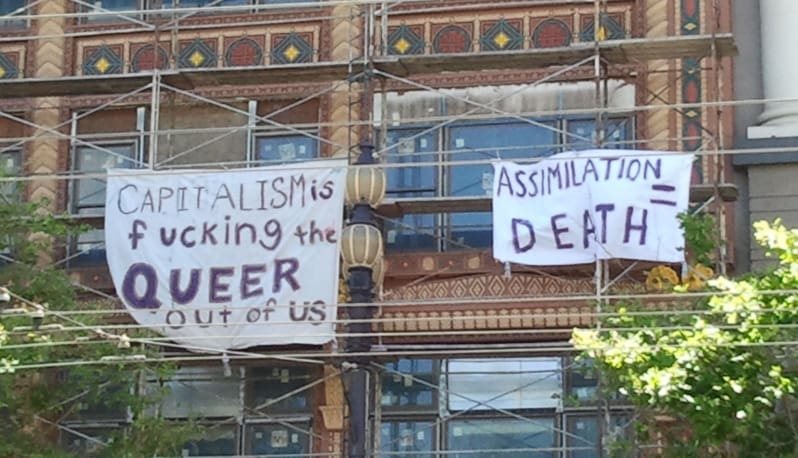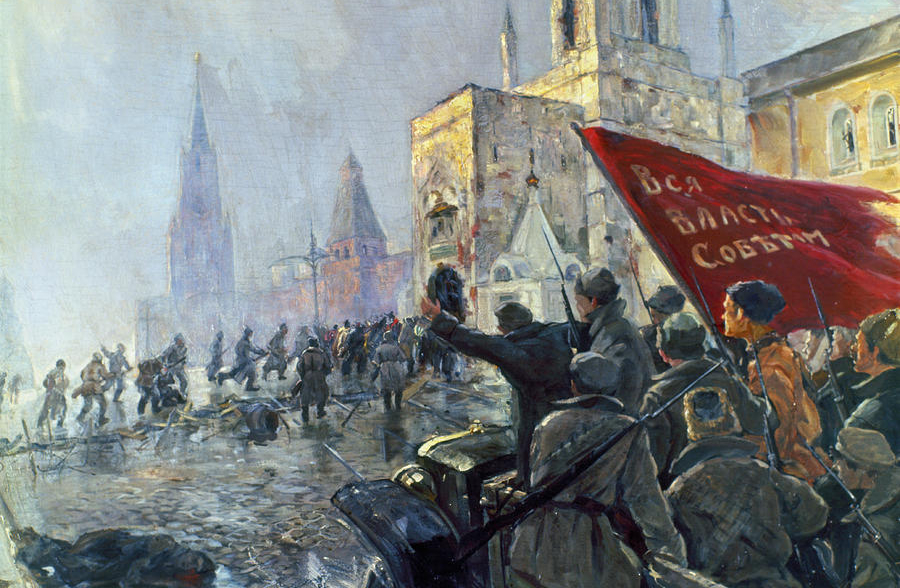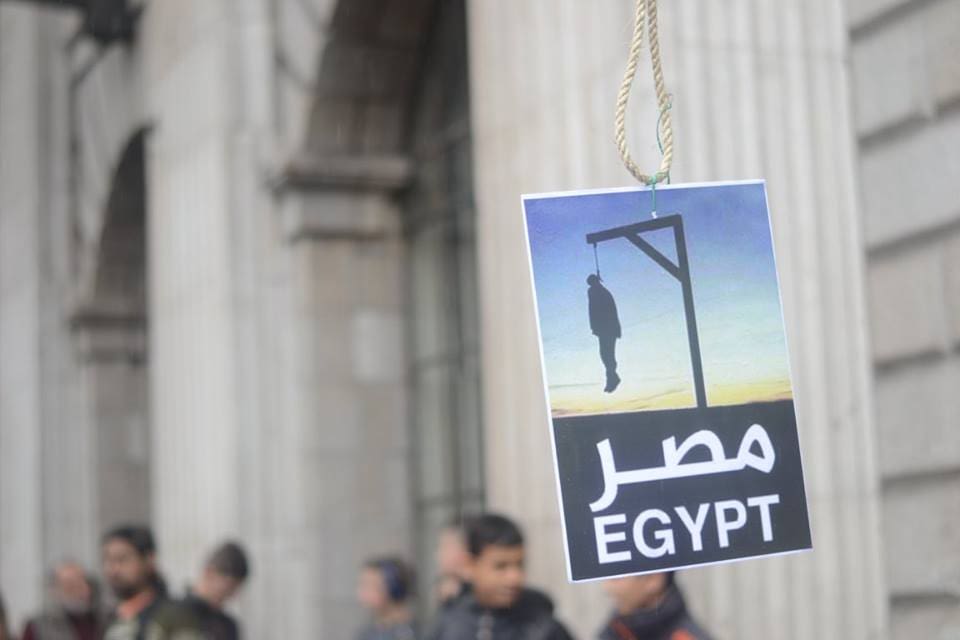Transcribed from the 27 May 2017 episode of This is Hell! Radio and printed with permission. Edited for space and readability. Listen to the whole interview:
Chelsea Manning, who should have been the LGBTQ movement’s Mumia Abu Jamal or Leonard Peltier, instead was shat upon by all the major LGBTQ nonprofits.
Chuck Mertz: Intersectionality is, roughly, when common ground is found between groups and the issues they want to address. So why can’t intersectionality be found within the LGBTQ movement? And what does intersectionality’s epic fail within LGBTQ activism have to do with the Democratic Party?
It’s time to find out, with activist Andy Thayer, who posted the CounterPunch article, “The LGBTQ movement is an intersectional fail.” Andy is co-founder of the Gay Liberation Network, one of the largest LGBTQ direct action groups in Chicago. He is also the co-founder of the Chicago Coalition Against War and Racism. Welcome back to This is Hell!, Andy.
Andy Thayer: Thanks for having me, Chuck, I really appreciate it.
CM: You write, “In recent years, intersectionality has been the biggest buzzword in progressive circles, liberally sprinkled in activist conferences and social media. Yet few movements have been as long on intersectional talk, and little on action, as the LGBTQ movement.”
So first, Andy, can you just give people a simple description of what intersectionality is, so we can continue the conversation?
AT: Intersectionality is in many respects a modern updating of the term solidarity (which itself has a long history going back to at least the nineteenth century), where supposedly separate movements are interlinked, and each alone is much more likely to fail if they are separate rather than linking up and giving genuine support.
Intersectionality, in addition to that, recognizes that most of us carry multiple identities. In the LGBTQ movement, for example, there are of course many people of color. Lesbians obviously carry multiple identities, as women as well as lesbians. It’s a recognition of those links and that the siloing of movements—that we saw particularly during the eighties and nineties—is a recipe for failure. The single-issue approach is a recipe for failure. In that respect, I think it has been a welcome reintroduction to what we in GLN have called solidarity politics.
It came out of academia, but it’s a nice updating of the concept of solidarity that had long been lost. For example, I have been active in the antiwar movement for many, many years, where the issue of Palestinian solidarity was anathema to many liberals—which was in turn anathema, frankly, to the concept of solidarity and intersectionality. So I think it is a useful concept. But I don’t think it is all that new.
CM: You write “Few events point up this intersectionality fail [when it comes to LGBTQ activism] more clearly than the release from prison of transgender heroine Chelsea Manning. She is by far the single most important, impactful antiwar activist and whistleblower that the LGBTQ movement has ever produced. She exposed war crimes by the US and its allies in Iraq and Afghanistan, including murder and torture. […] This information helped fuel the wave of Arab Spring revolts, the largest democracy movement ever seen in the region, knocking out a number of those dictators. Yet from the 2010 arrest through her subsequent arduous trial and most of her incarceration—the longest imprisonment of a whistleblower in US history—none of the big LGBTQ nonprofits defended her.”
When I mentioned this to my girlfriend, she was stunned that there would be an LGBTQ group that wouldn’t be rushing to the defense and support of Chelsea Manning. In your opinion, why didn’t the LGBTQ nonprofits support Chelsea? And which big nonprofits are you referring to?
AT: Frankly it’s all of them, Chuck. The national LGBTQ Task Force, for example which postures itself as the most progressive of them all, didn’t lift a finger for her until after Clinton lost the election. Then a group of them did put out a letter saying, “Please release Chelsea.” But for the entire preceding seven years of her incarceration, they had done nothing. The Human Rights Campaign, which is the largest of the LGBTQ nonprofits, didn’t even do that much. None of the military support organizations, in their various iterations (there were two of them at one point and now they’ve merged), supported Chelsea Manning. In fact, it’s pretty clear that they actively campaigned against her being named the Pride Parade Marshal at the San Francisco Pride Parade a few years back.
What Chelsea Manning did deeply, deeply embarrassed not just George W. Bush, but the Democrats. She pointed out that the United States had committed war crimes in Iraq and in Afghanistan, most infamously with the so called “Collateral Murder” video, which showed United States troops murdering twelve Iraqi civilians, including two Reuters journalists. Reuters tried to get information about this through the Freedom of Information Act and all that; they did all the right things legally and of course got nothing. It wasn’t until Chelsea Manning actually released the video of it (which the United States troops themselves had made) that we then got some confirmation about what actually happened.
It was deeply, deeply embarrassing to the Obama administration, because it showed that Obama was following right in George W. Bush’s footsteps in terms of pursuing a murderous war of occupation (he campaigned, of course, as an antiwar candidate—at least against “stupid wars”). He was continuing the stupid war in Iraq in that instance.
It’s about the issue of class. Issues of homelessness and low economic opportunity for young people should be front and center for the LGBTQ movement, because it’s hurting the section of our movement that is traditionally the most dynamic, which is young people.
She also exposed the United States’ support for a whole series of dictators and oligarchs across the Middle East. And this was information which many have cited as helping spark and fuel the so-called Arab Spring. We have to remember: this was the largest democracy movement that region has seen in its entire history. It helped topple a number of oligarchs across the region. Unfortunately, the United States, under the Obama administration, supported dictators like Hosni Mubarak right up to the very end, only dumping him (like they have in many other previous instances) when he couldn’t control his own population.
She also exposed the United States’ support for the 2009 military coup in Honduras, which was the first successful coup in Latin America in the 21st century, and which led to that nation having the highest murder rate in the entire world for several years after that—including the murders of countless LGBT people, campesinos, and labor organizers in that country. That was a direct result of the Obama administration’s actions. And in that instance, Hillary Clinton, as secretary of state, was the number one out-of-country supporter of that coup regime.
So Chelsea Manning, who should have been the LGBTQ movement’s Mumia Abu Jamal, who should have been the LGBTQ movement’s Leonard Peltier, instead was shat upon by all the major LGBTQ non-profits. I remember being contacted by what was then known as the Bradley Manning Support Network, which was formed by a great organization called Courage to Resist, and they were frustrated because they had approached all the big LGBTQ nonprofits to support Chelsea and had gotten no place, and so ended up instead contacting our modest-sized organization here in Chicago to see if they could generate some LGBTQ-specific support for Chelsea. It’s a shame that they had to work that far down their Rolodex in order to find any kind of LGBTQ support, but it shows just how our movement has been tied at the hip with the Democratic Party.
Again, it’s about the issue of class. That’s something that all of our movements need to pay attention to. The business papers talk about class stratification incessantly. Pick up the Economist or the Wall Street Journal, they talk about this (although they obviously talk about it from the standpoint of how they can control this country in a circumstance where poor people have every right to be getting even more angry at those who run the country).
In the LGBTQ movement, class has a particularly savage effect, because young people, if they are unable to get out from underneath the dictates of homophobic or transphobic relatives, are much less able to be active. They risk homelessness. The fact is that young people in their twenties today are making twenty percent less than baby boomers did. They are far less active in the workforce than baby boomers were. This lack of economic independence means it’s much more difficult to come out. It’s much more difficult to stake your own claim in the world rather than being under the dictates of your parents, and it’s a reason why we’ve got horrific LGBTQ youth homelessness rates. According to some, one quarter of young people who are homeless are LGBTQ, and some put it much higher than that.
So again, this should be front and center. Issues of homelessness and the issue of low economic opportunity for young people should be front and center for the LGBTQ movement. Because it’s hurting the section of our movement that is traditionally the most dynamic, which is young people. It was young people who led the Stonewall rebellion. It was young people who led the early Gay Liberation Front organizations which put our movement on the map.
CM: You talk about how the biggest LGBTQ nonprofits—you refer to them as “Gay, Inc.”—were initially against the equal marriage issue. You say that was because “their main guy, president Bill Clinton, was directly implicated in the worst measure enacted against it, the Defense of Marriage Act, and the series of failed Democratic presidential candidates who followed him also opposed equal marriage rights […] After Bill Clinton appeased the right by passing the 1996 Defense of Marriage (and NAFTA, and Anti-Terrorism & Effective Death Penalty Act, etc.), he took out ads on Christian Right radio stations, bragging about it as part of his re-election bid.”
What impact do you think Bill Clinton’s support for the Defense of Marriage Act had on this past presidential election? We’ve mentioned how there were those who wouldn’t vote for Hillary because of NAFTA, or because of the crime omnibus bill that led to increased levels of mass incarceration, or because of Clinton-era welfare reform that led to an increase in homelessness. To what degree do you think we can include the Defense of Marriage Act in the myriad reasons voters didn’t support Hillary because of the policies that were put into place during the first Clinton administration?
AT: There is a real generational disconnect within not just the LGBTQ movement but frankly all movements. It was also young Black Lives Matter activists versus their elders, who were solidly Democratic. We saw this right across the spectrum, where the younger group were either Bernie supporters or had totally washed their hands of the Democrats entirely. I can remember reading stuff about Hillary supporters trying to shame their younger sisters for not supporting what would be the putative first woman president. And young women ended up supporting Bernie Sanders far more than they did Hillary Clinton. Then when it came to the general election, of course, we had most white women supporting Trump. So these fissures were not unique to the LGBTQ community.
The notion that you have to have funding in order to have a strong organization is misplaced. Yes, certainly, a certain level of funding is necessary. But I think too often grassroots organizations have succumbed to so-called “donor capture,” where it’s the wealthy donors to the organization who end up setting the tune for what sorts of issues they pursue.
I think that DOMA is, at this point, old enough that it didn’t have any impact on the 2016 election. But the class issues were really fundamental for a lot of folks.
Young Black Lives Matter activists talked about how all they got out of the Obama administration’s response to Ferguson was pledges for body cameras—not a wholesale reevaluation of policing in the United States, let alone abolition. And they were rightly disgusted. It reminds me of the fissures that we saw in the civil rights movement going back to the early 1960s, where there was King Sr., MLK’s father, along with all of his generation in the black civil rights movement, supporting the Republicans. They were the party against slavery going back to the 1860s, so most established activists in the black community were rock-ribbed Republicans, because the Democrats were the party of the Dixiecrats, the racists, the Klan, etcetera. But as the younger generation of King Jr. came up, they were saying, “What have the Republicans done for us in the last century?” And they had a good point.
In the 2016 election, Black Lives Matter never endorsed Hillary or even Bernie; they saw that the Democrats had been promising all sorts of things for the decades since the great civil rights movement, but had not been doing anything, that they’d rolled over on issues such as affirmative action—that they’d rolled over, specifically, on issues of economic development for the black community. The devastation of the Great Recession wiped out the first generation of black equity in United States history (through home ownership). Young people in the Black Lives Matter movement looked at that and said, “Well, what have the Democrats done for us except bail out the banks? Our parents are losing their homes.”
CM: And then we have the Democratic Party changing from traditionally liberal towards neoliberalism. How do you see that reflected within what you call Gay, Inc.?
AT: They’ve basically danced to the tune of the Democrats. We had Sanders, of course, talking about a new New Deal—that has found really no echo in the LGBTQ movement. And we can debate about how hypocritical Sanders is, given that he also supports the United States’ military in terms of funding and so forth, which basically makes it impossible to fund the sorts of programs he talks about. We should be talking about how we need a massive public housing program to bring down rents for everyone—not just poor people, everyone—so that everyone can afford a home, including LGBTQ youth; we should be talking about a massive public jobs program, a WPA-style program that would put our youth who want jobs to work; we should be talking about wiping out student debt and the idea that higher education should be accessible to working class families. Those issues have no place on the agenda in Gay, Inc., and they should be front and center.
And not just for our Gay, Inc. organizations: women’s rights organizations, for example, can’t figure out why young women aren’t enthused about another neoliberal democratic candidate like Hillary. If they were talking more about seriously implementing these kinds of programs and cutting back the military so as to pay for them, then they might see younger support for their candidates. But that isn’t going to happen. We’ve seen over and over again that the issues that are acceptable to the Democrats are the only ones that make it onto the agenda. In a neoliberal world, that means that the only issues that they are willing to push are ones that do not cost the system money.
I benefit from the fact that we got equal marriage rights in the LGBTQ community. I campaigned for many years for that issue. Transgender rights: being able to use public restrooms and other facilities that correspond with your gender identity is very important. But at the same time, we have to recognize that these reforms, when and if implemented, do not cost the major corporations or the government any serious money the way that, say, WPA programs, a massive public housing construction program, or a massive jobs program would.
CM: You know, I started thinking about the difficulties when it comes to fundraising. You write, “For all their talk of grassroots organizing (another phrase that’s become hackneyed through repeated misuse), Gay, Inc. organizations are staff-driven at best and at worst controlled by self-selected boards chosen for their ability to tap contributions from wealthy donors. In this way, the wealthiest LGBTQs control the political agenda of what passes for our movement, a pink version of the class stratification talked about in straight society but rarely mentioned in the movement.”
From what you write, it seems like Gay, Inc.’s focus is first on the bottom line, and that they may believe that the resources are the most important thing in promoting LGBTQ rights. How much can the resources needed to support a movement be the movement’s downfall? Is there an activist or a movement “resource curse”?
AT: Yes. There is so-called “donor capture,” which many have talked about. But my experience has been that funding is not the most critical element of supporting truly grassroots organizing. I mean, we have survived without a paid staff, or an office, even, and the overhead that all of that represents, for years and years. This notion that you have to have funding in order to have a strong organization is misplaced. Yes, certainly, a certain level of funding is necessary. But I think too often grassroots organizations have succumbed to so-called “donor capture,” where it’s the wealthy donors to the organization who end up setting the tune for what sorts of issues they pursue.
My advice to young organizers is to be very wary of people who come to you bearing cash—they can be your biggest downfall, and it’s really important to avoid that. There are ways of doing things cheaply, especially in these days of the internet, that older generations of activists could only dream about in terms of ways to get your word out. So avoid the donor capture of people coming to you bearing gifts of cash.
CM: Andy, we really appreciate you being back on This is Hell!.
AT: Absolutely, Chuck. Thanks.
Featured image source: Indybay





